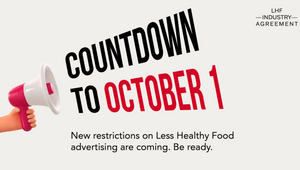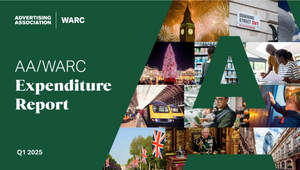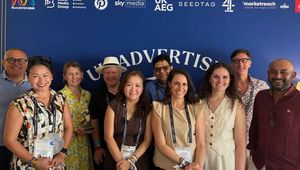
All In: Why the UK Ad Industry is Taking its Biggest Census on Inclusion

It’s becoming cliché to talk about inclusion as if the ad industry only heard of the concept after the heart-breaking events of 2020 that re-energised the global Black Lives Matter movement. Of course, recognising the industry’s failure to do marketing in a representative way has in fact been a slow, dawning realisation over many years, punctuated by wake-up calls like that, as well as threshold moments around which progress suddenly crystallises.
Hopefully, one such moment for the UK advertising industry could be in a month’s time, as The Inclusion Group launches All In, a campaign to help build back a better, inclusive industry for all - beginning with a fully confidential and aggregated industry census on March 10th 2021. Recorded and analysed by Kantar, it will provide the best record of the make-up of UK advertising’s workforce and a vital benchmark for progress. The results will be used to inform an Action Plan to be launched at an industry summit this summer addressing how greater inclusivity across all areas of the industry’s talent will be achieved.
The census is almost a year in the making. The Inclusion Group formed in April 2020 with backing from the Advertising Association, ISBA and the IPA. Chaired by Kathryn Jacob, CEO of cinema advertising contractor Pearl & Dean, the group began with the basics, realising that in order to make a concerted effort on inclusion, the industry needed to know the extent of its problems. “We can't go anywhere until we know where we are,” says Kathryn. She and the group were well aware of the people “with the very best intentions talking a good game, and then not doing anything.” A large reason for that, she suggests, is that “there's no standard to measure yourself against.”
“We can talk about our representation, our work and how we attract people into the industry,” says Sharon Lloyd Barnes,” commercial director of the Advertising Association. “The first port of call has got to be getting our housekeeping sorted out.”
Many companies already collect their own data on the makeup of their workforces, to varying degrees and using different methodologies. And the UK agency association, the IPA, already runs its own regular census, which has thrown up useful data. But to borrow a classic British ad slogan, All In does what it says on the tin - its goal is to invite all of the ad industry, not just the creative agencies. “It's the first time ever that we've tracked the whole industry.” says Sharon.
“And it is a deeper dive,” she adds. All In will gather data on nine characteristics of advertising employees. These are based on government descriptors used as ‘protected characteristics’: age, gender, sexual orientation, ethnicity, beliefs, disability/neurodiversity and education. The Inclusion Group also broadened it out to include salary and position. “It's absolutely going to open up to a wealth of data that has just never ever been tracked before,” says Sharon. On top of these basic descriptors, the census will ask about how people identify themselves and about their experience at work - perspectives on company culture and experiences of discrimination for example. Thanks to its anonymous and aggregated methodology, All In hopes to make respondents comfortable to share sensitive data, which could prove valuable in identifying the problems in these areas. This is reinforced by the fact that the Advertising Association won’t be recording and analysing the census itself, with market research company Kantar taking up that role.
Kathryn expands, adding why a lack of this depth has stopped comprehensive analysis across the industry taking place before. Although companies each collect data on different characteristics of employees, it’s never been consistent. Some collect some diversity data, others record different characteristics. “It's a bit like comparing shoes and a coat,” she says. “It all comes under clothing, but it's not the same thing.”
One barrier to building a complete picture of the advertising industry’s makeup could be companies being reluctant to admit how short they’re falling when it comes to inclusion. That’s why the responses will be gathered on an individual level - data won’t be shared on how companies are doing, but how the industry is made up as a whole.
Why does the UK ad industry need to find out how bad it’s doing on inclusion though? You’d be hard pressed to find someone who argues that it’s already fixed those problems. You only need to look at the faces making up companies’ boards to understand more needs to be done. The fact is the industry knows it’s doing badly on inclusion, but Sharon argues that All In will help to understand where energies might best be directed to drive positive change. “A lot of people show a real improvement in recruitment, for example, in people from different multicultural backgrounds,” she says, drawing on conversations she’s had with many of the association’s members, “but retention and progression is an issue.” The census, she predicts, will provide concrete data to back up that anecdotal evidence. Paired with questions All In is asking about salary and about position, what needs to change most sorely will be clearer. “There'll be a lot of interesting hypotheses that come out of that,” she says.
“The call for something like this census is huge,” says Kathryn, who’s heard many such stories on calls with dozens of business leaders since she took up The Inclusion Group chair. “Because it is just all anecdotal at this stage, just people's gut feel. What's really brilliant about having this in a matter of weeks is that we'll know, and we’ll have something really tangible to build on.”
Sharon is keen to stress that it’s business leaders’ responsibility to step up here. The campaign’s focus is on asking CEOs to commit to participating in the census. March 10th is a moment to make a statement, she says, “an opportunity for the industry leaders to link arms and make a stand on this.” That, The Inclusion Group hopes, will be further encouraged by pressure on these leaders to sign up from their employees.
Taking part should be seen as a civic duty by everyone in the UK ad industry, they suggest. “It’s all about people understanding this is the same as voting in an election. It's your commitment to the wider community,” says Sharon. In the pandemic people have got more used to the culture of stepping up and doing our part to protect society. Sharon thinks that translates to the census: “Hopefully, on the back of the whole pandemic experience we're all now aware of what we're doing for each other. We're staying at home, keeping everybody else safe. It's the same notion with this census. If you don't take part, you're not playing your part in the sort of health and success of the industry.”
We shouldn’t lose sight of the fact that the end goal here isn’t just to beat discrimination and give people an equal chance in the industry - as valid as that mission is in itself. Leaders in the Advertising Association’s membership know that a lack of inclusion poses a serious business threat - the industry needs to fight to prevent itself from becoming irrelevant. As Boston Consulting Group found in 2018, companies with diverse management teams reported innovation revenue that was 19 percentage points higher than that of companies with below-average leadership diversity. “If we don't become a place where people want to work because they think they won't belong, we won't get people joining,” says Kathryn. “And then we won't be truly reflecting the communities that we serve.”
The results from the census will be used to inform an action plan to be launched at an industry summit this summer addressing how greater inclusivity across all areas of the industry’s talent will be achieved. As Sharon puts it, rather than reinventing the wheel, the Advertising Association will be drawing on the good work many in and around the UK advertising industry have already done to provide resources, initiatives and best practice in promoting inclusion. The plan is for the industry to start borrowing from what works and collectively “putting some firepower behind” it. This will take the form of an all-industry inclusion hub. Once it’s clear where change needs to be made, a toolbox will be there to equip every business with what they need to achieve that change. (Currently the hub is called UK Advertising Needs You, but it will be rebranded when All In’s findings are launched, says Sharon.)
The diversity and inclusion conversation in the industry has been through peaks and troughs over the years. As Sharon says, “there's still a lot of eye rolling when you bring up diversity and inclusion.” The discourse has once again reached a place where some consider it to be “a bit finger wagging.” She hopes All In is the kind of uniting, tangible action that can break that cycle. “It's not saying ‘you're not good enough’, or ‘we're better than you’. We're just levelling out the playing field and saying, ‘let's see what we actually look like’. Hopefully it'll drive a truck through all of that apathy.”
Any company wishing to take part can find out more at the All In page on the Advertising Association's website.















